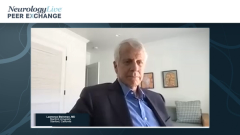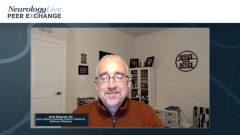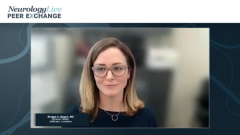
Targeted Vaccination for the Prevention of EBV
Amit Bar-Or, MD, FRCPC, discusses the potential impact vaccination against Epstein-Barr virus could play on multiple sclerosis rates, highlighting recent investigations.
Episodes in this series

Scott Newsome, DO: Speaking about targets, I’ll ask you, Amit. I know you’re involved in quite a few vaccine studies. You’ve done a tremendous amount of work in that world. If we had a vaccine available for EBV [Epstein-Barr virus], what would your process be? Is this something you could envision giving all children a vaccine for and, hopefully, prevent the primary infection and downstream effect and prevent MS [multiple sclerosis]? Or is it that we don’t have enough information? Thirdly, for people who have MS, would we give them the vaccine? There are pros and cons, so what do you think?
Amit Bar-Or, MD, FRCPC: It’s a complex question. I’ll take a stab at it, but I’m keen to hear what my colleagues think. There are major challenges to thinking of preventive vaccine studies in MS because if you think about it, there’s epidemiological evidence to suggest that the risk of developing MS occurs in a window relatively early in life, possibly adolescence, maybe even prepubertally. That’s based on various migration studies as Ahmed Obeidat mentioned before. And so if EBV as an environmental exposure, which we think is necessary, is playing out in the context of that type of a window, when should you give a vaccine to prevent MS? If it’s indeed in the pediatric world, you’re facing at least 2 major challenges.
One is how long do you need to wait? This is a study that will probably need to be 20 or 30 years long. How many people do you need to treat? When you think about the risk of MS being in a high-frequency area—250 or 300 of 100,000 cases—how many people do you need to follow and for how long? Just thinking of the scope of the study is pretty daunting at this stage. Of course, there are safety considerations in children, and it’s unlikely that a new EBV vaccine is going to be introduced in children before being introduced in adolescents or young adults.
The other perspective is to think of whether we’re trying to prevent EBV from causing MS in the first place or preventing EBV’s punitive contribution to ongoing disease activity. Might we try to use an EBV vaccine in the first pass to limit the development or severity of infectious mononucleosis? Could such a study provide us physicians safety data as well as potential efficacy in terms of impacting EBV biology? In the context of infectious mono, which of course is not MS, the risk of MS increases another 30-fold in individuals who have clinical infectious mononucleosis. Would that be a reasonable steppingstone to look at larger populations over a longer period of time?
As you may know, there’s a lot of excitement about EBV vaccines. Some of it looks at protein type and nanoparticle-generated vaccines like Moderna’s, which are built on the mRNA [messenger RNA] platforms. A couple of vaccines, at least, are being considered. These are exciting developments, but the challenge is going to be exactly as we suggested: when, where, and to what population…. Do you look at vaccines first in some other EBV-mediated pathology—proliferative disorders, post-transplant—and get a proof of principle? That proof-of-principle piece, when you asked about what else we need to know, behooves us whatever we do at the level of intervention. Whether we’re intervening early or during established disease, we try to get the biological proof of principle. Larry Steinman over the years has taught us that it’s of great value because it will teach us not just about the intervention but something important about the disease itself.
Transcript Edited for Clarity
Newsletter
Keep your finger on the pulse of neurology—subscribe to NeurologyLive for expert interviews, new data, and breakthrough treatment updates.
















